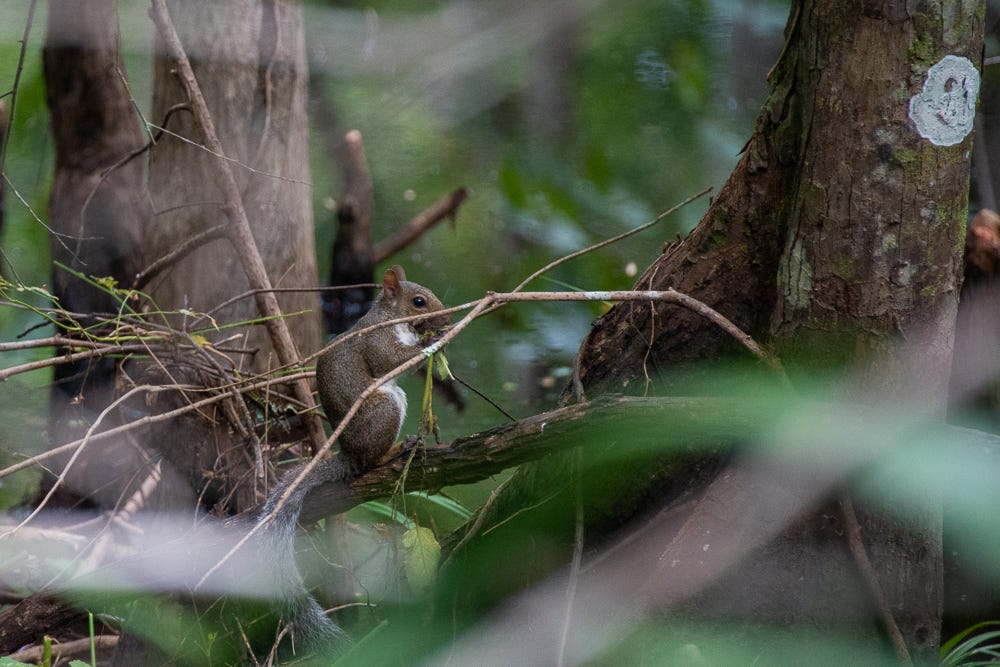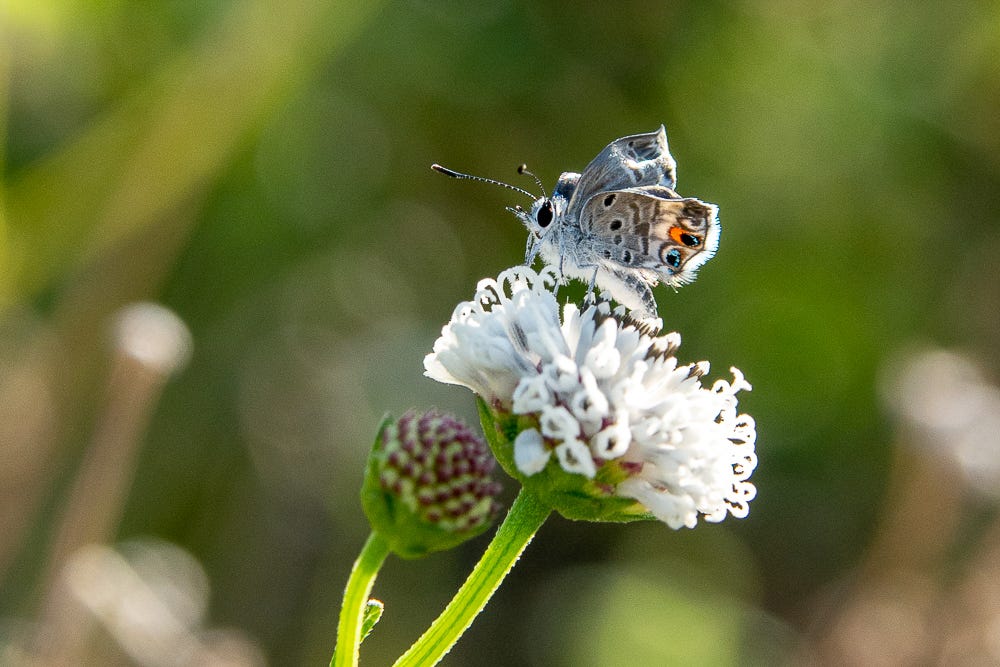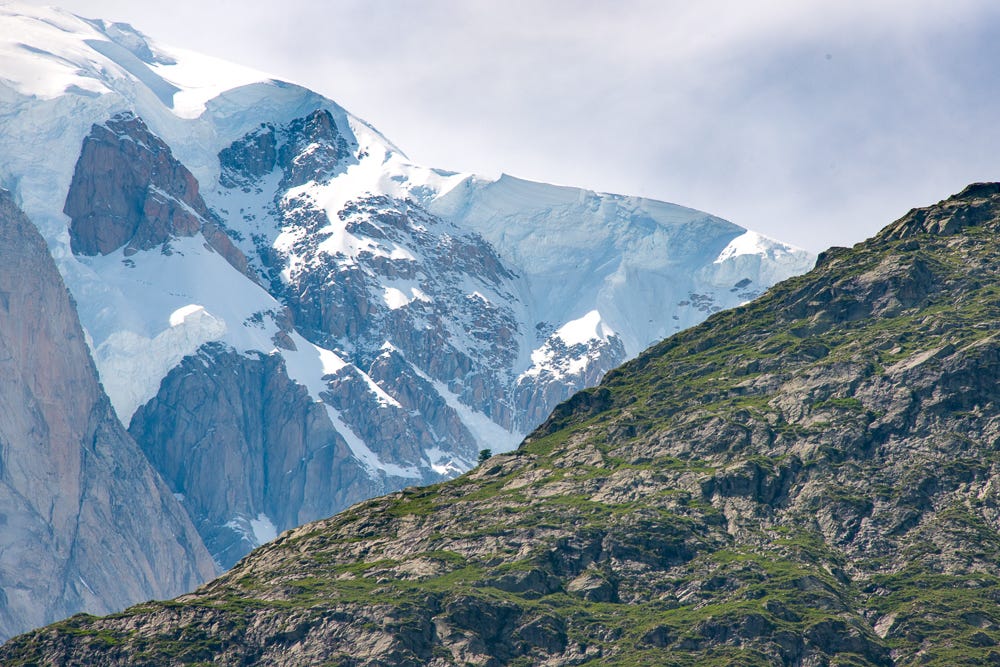‘We are Past One Tesla & One Vegan Diet at a Time’
What we can actually do about climate change, summed up by Bill McKibben, and me
A few weeks ago, climate activist and author Bill McKibben was the keynote speaker at the Outdoor Writers Association of America’s virtual conference, an organization of which I’ve been a member for about two decades.
While outdoor writing and environmentalism would seem to go hand-in-hand, it wasn’t until recently that the leadership started to seriously integrate that theme. I’m so thankful that has finally happened. There are some times in history when it’s okay to just go about our daily routines. There are other times which are exceptional, and demand more.
We are now living in one of those exceptional times. And so we need to be exceptional.
I realized something big while watching McKibben talk. He and others have dedicated their lives to trying to get all of us to act with urgency. Had we listened to them 20 years ago, our chances of success would have been infinitely greater. But instead, they’ve proven that it is an uphill battle to get people to change their priorities. For me, it wasn’t until I was sipping a blurry cup of coffee at 7 o’clock on a snowy February morning, watching to McKibben on Zoom, when the ridiculousness of the whole situation finally sank in.
There is so much more I could have done over the course of my life. I understood the problems of climate change, but I didn’t take action as if the lives of all of the people I know, and all of their descendants to come, all of the squeaky marmots, alpine wildflowers, mangrove swamps, crisp snowy mornings, sage-baked desert plains, and rain-soaked primeval forests that give me life, as a human, depend upon it. I didn’t take much action, even when I learned that just by my existing in this over-consumptive country, I am sealing the fate of millions of others around the world who will suffer, who are suffering, from my inaction. No, instead I’d just be quiet and uncomfortable when people would make fun of Al Gore’s cadence.

What could have been so pressing in my daily routine of 47 years that I neglected to do more to help with or speak up about this issue? I think I didn’t do that much because I was broke, and busy finding work, and my car kept breaking down, and my old boyfriend was annoying, and the mountains were calling, and dinner needed to be made, like every night.
But maybe the more accurate answer is that in general it’s hard for us humans to make a mental transition into urgent mode, because our lives as a species have been relatively stable for a long while. During our lifetimes, we’ve come to believe that the wheels of change move slowly.
Experience has shown us that the road ahead inevitably resembles the road behind. But suddenly, that is no longer the case.
Our world is rapidly becoming unsettled. Each decade from now, our planet and our lives as we know them will change exponentially. The less we act, the more chaotic it will become. The more sorrow we will have watching that which we love most disappear.
That’s called climate grief. It’s natural. It’s healthy. And all of the experts agree that the best way to combat climate grief is to do something.
So what is that something? In a minute, we’ll get into McKibben’s wisdom. But first, here’s my two cents.
Since we have less than nine years to halve our current emissions, if we want to have a functional civilization a few decades down the road, this whole bit about helping nature can’t just be lurking on the sidelines anymore. It has to become an active part of our daily lives.

We need to make time every day to learn more about climate change. What are the industries that create the most carbon emissions? How can I use my areas of expertise to innovate ways to reduce carbon and be more nature-friendly? How can I rethink my business and use my particular influence to push colleagues and leaders to strive for a healthy planet? How can I influence my HOA, my town transportation, or my religious leaders?
It doesn’t all have to do with carbon, either. All of our problems are fingers on the same hand. Pollution. Biodiversity. Wealth and wage gaps. And especially racism, or seeing one group of people as less deserving than another. That’s a biggie when it comes to stemming climate change. So is community resiliency, because times are going to get harder, and we need to be there with ideas in place to help our neighbors. The most elegant solutions realize it is all connected.
We need all of the voices. We need a big, loud, beautiful chorus, singing about the world we want to make.
It sounds overwhelming, but not if we realize that each one of us can simply focus on our own role in that chorus. We each have a specialty. It doesn’t matter if it’s retail, or city planning, or garbage management, or diapers. Whatever it is, there are ways to do it better. Research those ways, join movements, share ideas, network, innovate, and press for change. Make this part of the daily routine. People will listen. But we have to make the time to talk to them, and educate ourselves.

Speaking of listening, let’s get to what Bill McKibben had to say to the writers.
McKibben has been talking about climate action for a couple of decades now, so he’s got his thoughts pretty well organized. He also does a climate newsletter for the New Yorker, which is free to subscribe to. Most of what follows is a paraphrase of his talk, but I’ve added in a few ideas beyond that as well.
First, the problem in 17 words: each day we are adding the equivalent heat energy of 400,000 exploding Hiroshima bombs into our atmosphere.
We are now starting to see the beginning of that damage. The Great Barrier Reef is half of what it was five years ago. Australia’s fires killed an estimated 3 billion animals. Half of Bangladesh was underwater with flooding. Failed crops are causing mass migration and starvation (this is what sent Syria over the edge). The jet stream has become unstable. The Pantanal, the world’s largest wetland, caught on fire last year and a quarter of it burned. Back-to-back hurricanes walloped Honduras and Nicaragua.
The people in countries like Honduras, Syria, and Bangladesh contributed almost nothing to climate change, but they are bearing the brunt of our follies.
When immigrants from Central and South America turn up on our southern border, we need to remember that they did nothing to create their predicament. We did, enabled by climate change deniers and the fossil fuel industry campaigns that enable them. Because of our power infrastructure, meat-heavy diets, large homes, love of cars, and consumption of excess stuff, the average American creates twice the amount of greenhouse gas as our counterparts in Europe and Britain and 10 times as much as the average person in India. That means that even though India has 1.3 billion people, the U.S. still emits more carbon. That also means that those of us who live in this country have a disproportionate amount of power to make serious positive change.

Unlike other political problems, climate change is a timed test.
McKibben used this analogy: If we don’t solve universal health care now, it will be painful for many, but the problem won’t be any harder to solve in 20 years than it is today. “Climate change isn’t like that,” he said. “If we don’t solve it now, we will never solve it… 2030 is a very sobering deadline.”
And that’s why so many people are trying so hard to make this happen. It is dire, but there is hope.
Humans are pretty good at gearing up for war, so we should also be decent at gearing up to save our beautiful planet (that’s a Karuna interjection).
Now that we know what was holding us back, namely the denial campaigns waged by the Exxons of the world, and now that we have stupendous momentum from climate movements and thousands of Greta Thunbergs fighting for their own futures, we are beginning to show how quickly we could be capable of turning the table.
Already, engineers are proving that switching the grid to renewable energy, once a pipe-dream, is perhaps one of our easiest tasks ahead. Innovations have dropped the price of solar and wind power to the point where renewable energy is now the cheapest form of energy on most of the planet. The price of solar has gone down 90 percent in the last decade (remember that bit where we’re stuck on the idea that change happens slowly?). The latest big wind farm that went up off the coast of Britain took just 18 months to erect, and produces as much energy as a nuclear power plant.
Despite this good news, we have a long way to go. The odds are still against us.
‘We can’t be neutral in this fight.’ Here’s how to join it.
“If you value fishing, farming, forests, and the seasons, then these are things that you have to defend and protect at this point,” McKibben said.

Karuna adds: taking a stand, in the short amount of time that we have, will require our daily attention. It compels us to decide that, moving forward, nature’s health is synonymous with our own health. We can’t keep taking more, eking out a little more profit in exchange for a little more destruction. No. It’s time to start giving back, in every way that we can.
How to do this, says McKibben, is that we need more people to pay attention and talk to their communities about the things that their communities care about. Because this isn’t a single-issue problem, solutions will require innovation in every corner of our society.
If you’re on the land, your conversation could be pushing for regenerative agriculture, protecting old-growth forests, and using wind turbines as a stable income-generator for farmers. If you’re in the city or the ‘burbs, it could be planting green spaces for biodiversity, retrofitting buildings to be energy-efficient, replacing roads with biking and walking paths, curtailing sprawl development, and encouraging community gardens and corner markets. Retrofitting worked so well on the Empire State Building that it cut its energy use by 40 percent “without anyone who works in it noticing any difference.”
I add to this, we can push for pollution controls, equity and fairness in neighborhoods and housing, and create community libraries of things (places where we borrow what we need, instead of buying so much new stuff). There are a hundred thousand more ideas that we can each champion, based on our individual professionals and areas of interest. We just need more people to start imagining them, researching them, doing them, and encouraging others to decide that helping nature should be part of their daily actions, too.
This next bit is still from me, not McKibben, though I imagine he’d agree.
I know most of my friends reading this are probably tearing up, because they are already trying so hard, and it’s so frustrating to feel so helpless. I need you to know that our personal carbon reduction efforts are very much needed. They are vital in the longterm picture. But also know that all of our cutting back on plastic bags, bicycling to work, and buying used clothing is just a drop in the bucket if we don’t have government actively making sweeping changes. Politicians, and the people who fund their campaigns, hold the big strings. This next bit is still from Karuna…
Thus, our overwhelming concern is to make sure we have a government that agrees.
A government that is full of climate activists and innovative thinkers. We need powerful people to step up and do the right thing, stop funding climate deniers, and take forward-thinking action in dramatic ways like embracing the Green New Deal, instead of throwing up so many excuses, insults, cant’s, and whataboutthems.
Even if other concerns usually sway your vote, like taxes, or the economy, or abortion, or guns, or immigration, or government regulation, please realize that if we don’t solve this climate issue during this decade, none of those other issues will be relevant anymore — because during our lifetimes, our society and our natural world will cease to exist in the way we know it today.
So let’s put aside our other differences, and get into agreement on this. Let’s get out the vote and explain to people what is at stake, starting now. There are less than two years left until we might go back to the nightmare of a government moving backward on climate policy, and if that happens, we are sunk. There will not be enough time.
So what now? Let’s movement up, people.
“We are past one Tesla and vegan diet at a time,” McKibben said. Not that these aren’t valiant efforts, which have their place in the grand picture, but to take the magnitude of a stand that we need to take, in the short amount of time that we have, requires mass action. It requires changing the basic political ground rules.
To do that, says McKibben, “The most important thing an individual can do right now is to be a little less of an individual and join movements for change, because those movements are big enough to register and matter in our system.”
Indeed, research out of Harvard has shown that when 3.5 percent of the population engages in nonviolent protests and other civil disobedience actions, it has never failed to bring about change. That’s not a ton of people. We can do that.

There are a lot of good movements right now, so it’s just about finding the one you feel like you fit in with the best. McKibben founded 350.org, which is a good place to start. For youth, the Sunrise Movement is proving to be a force to reckon with. Some others of note are the protest-oriented Brittish-born Extinction Rebellion, the community-oriented Climate Justice Alliance, Elders Climate Action, 1000 Grandmothers for Future Generations, and Canada’s Idle No More.
I’m guilty of only being an email action bystander with these movements, so this week I’m going to research them more, pick one ,and get involved for real. I’m thinking it might be the most fun if I can do it with some family and friends. Any takers?
For more research, also check out this video from Grandmothers For a Green New Deal.
And finally, don’t forget that we will feel hopeless sometimes. But it’s vital to not throw up our hands and quit. Says McKibben:
‘We need to realize what the stakes are and just how beautiful this planet is.’
“It’s hard to understand from the suburbs, which are designed to hide the workings of the natural world,” say McKibben, “but those in rural places see the change underway already. There is extraordinary loss that comes with that change; taking a world as beautiful as the one we were given, and through carelessness, recklessness, and greed, taking that away. One of our jobs is to prevent that to the extent that we possibly can, and to bear witness to the world we have now, because it’s not going to be intact the way it is now. It’s worth trying to bear witness to the beauty around us, even if it’s somewhat of a painful task.”
It was a Zoom moment that struck a cord. At this point, many writers who were watching the lecture started posting comments, reminding us that to keep up our spirits and momentum, the best medicine is to get out and enjoy the mountains, streams, forests, and oceans. And, said McKibben with his parting advice, “When you get a snowstorm, make the most of it.”
Turns out, a major snowstorm is brewing. Maybe four or more feet. So Steve and I are headed back to Boulder for a few days to get snowed in, and take McKibben’s advice. I’ll get the weekly nature news roundup and tales from the Valley done soon.
Walks in the snow. Yay!


